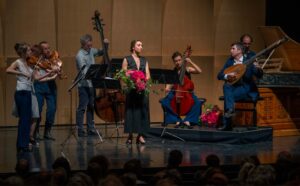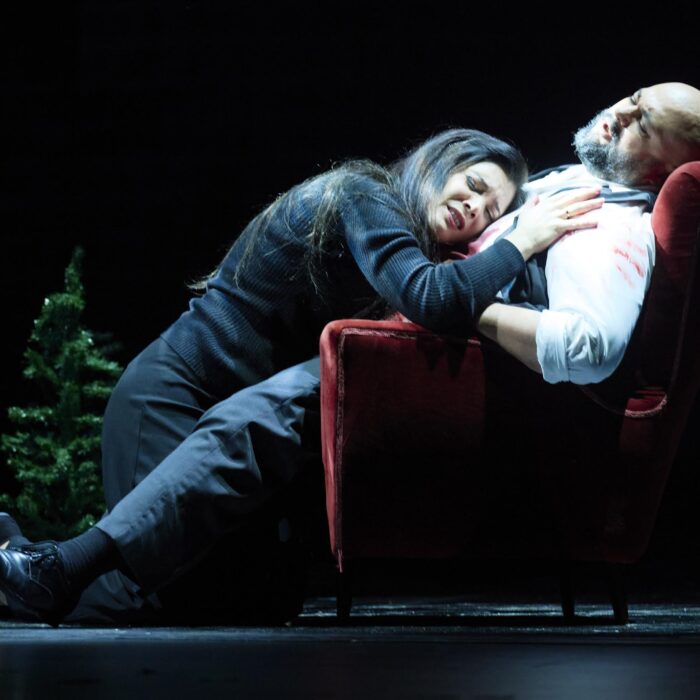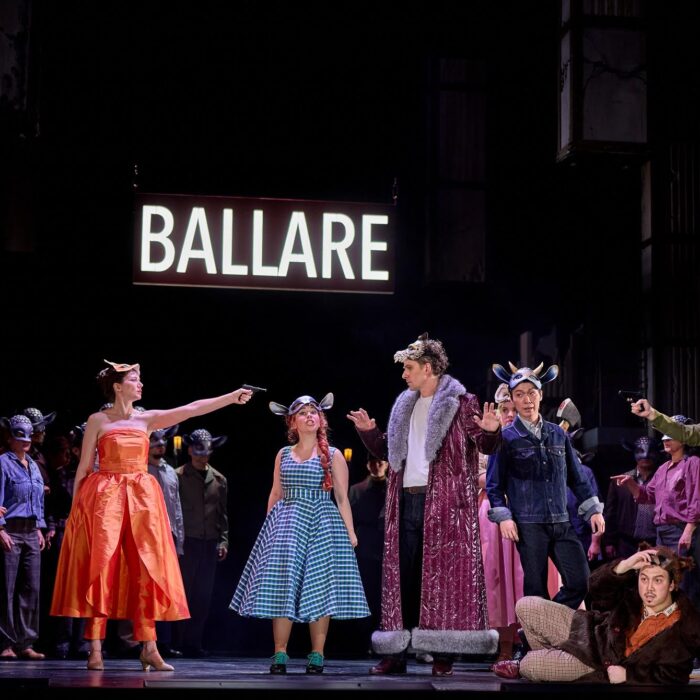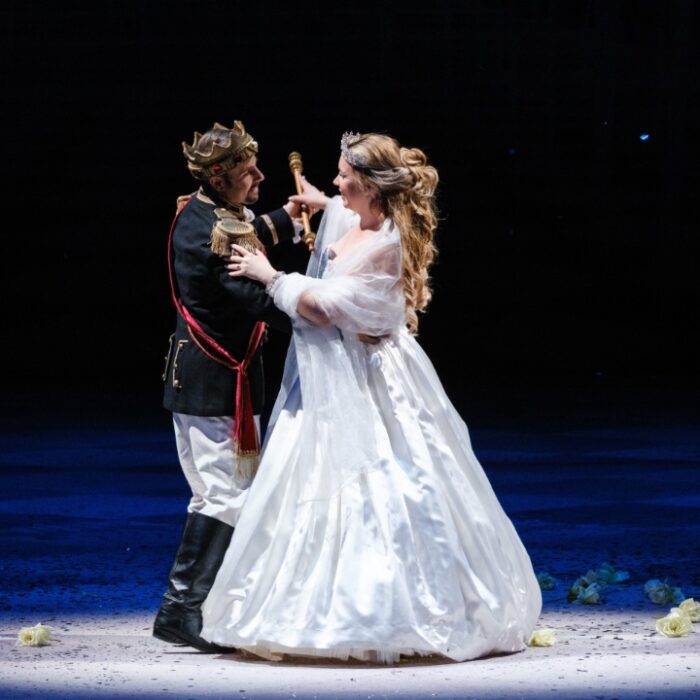
Salzburg Festival 2024 Review: Lea Desandre, Thomas Dunford, & Ensemble Jupiter
By João Marcos Copertino(Photo credit: SF/Marco Borrelli)
Thomas Dunford and Lea Desandre are pop. Young, synergetic, and talented, they exude a pop quality even when they are not singing the Beatles. It is a fresh thing that makes them desirable and somehow accessible. But how many people can play the lute like Thomas and sing like Lea? In their Salzburg recital, their pop-ness seemed diametrically opposed to how sublime their music-making can be—even though sometimes the pop was a bit off.
Musical Highlights
It was a very English night, devoted to the works of John Dowland and Henry Purcell—both specialties of Dunford and his Ensemble Jupiter. The music of both composers elicits an idiosyncratic joyful melancholia. But they are not the same. In Dowland, we find a certain approach to the prosaicism of the song that has hardly ever been matched; Purcell, however, gives voice to epic tragedy. Nevertheless, both are very demanding composers. Even in Dowland’s simplicity—its remarkable lyrics, its extremely singable vocal lines—we know that only an elect few can make them sound good. Remember when Sting decided to sing “Come again”?
The recital sought a middle ground between this pop approachability and the towering beauty of operatic singing; to my mind, it was more successful in the latter than the former. Desandre opted to sing all Dowland’s songs in an almost belting register, reminding me of a lighter voiced Audra McDonald, casting away any hint of vibrato. While such solution has its merits—few mezzos nowadays have a voice as purely beautiful as hers. However, this greatly undermined her sound projection and lowered both her vocal expression and richness of tone. Progressively, this lighter approach made her singing of Dowland somewhat monochromatic: she used the same vocal colors and the same dynamics for very different lyrics.
This also compromised some of the pressing quality of Dowland’s dancing sorrowfulness. Desandre, though a very good English speaker, is still in search of a more spontaneous pronunciation of the text. While in Purcell, a tragic solemn enunciation is more than welcome. Who can sing Dido vernacularly? She is meant to belong to another realm. In Dowland, I missed the perkiness and ease that showcases a pleasure within melancholia. Her “Come Again”, preludial, was congenial as an opening ceremony, but it felt a bit marbled—especially compared to the many instrumental variations played by the Jupiter Ensemble.
Still, in the Dowland segment of the program, there was much to be enjoyed, especially in the flushing movements in the instruments. “Sorrow, stay” and “Flow, my tears” were performed with a certain violet joy that revealed a complexity within early modern emotions, offering a lesson for life: why should we fear melancholia?
The instrumental moments, “Frogg” and “The King of Denmark’s Galliard”, were superb. They were a little more punctuated than usual, revealing a certain consonantal sound that is often neglected by wordless instruments.
Illuminating Purcell
The Purcell segment of the concert was infinitely superior. While I appreciate—a lot—the pop-ish elements in Dunford and Desandre’s partnership, I sometimes struggle with their element of accessibility. Part of pop’s appeal is precisely the combination of ordinary and extraordinary sound. Unless we are dealing with a belting queen, like Mariah Carey or Céline Dion, pop songs can be sung by normal people; opera arias cannot, with the sole exception of me in the shower. Therefore, Dowland, though exquisitely hard, feels singable. While Purcell, like Handel, does not. The ability to sing an opera aria makes the opera singer tower over everyone else, while some songs feel like an invitation to sing along. This is my impression of the phenomenon that Desandre and Dunford enjoy exploring in their recitals—and with good cause. In a certain way, they are the most talented hip-beach-kumbaya-singers the world has ever seen.
However, it is just an illusion that pop equals accessibility. While we hear opera singers exuding their god-like voices, they are there, in front of us, unmediated and unplugged. We can see them and ask for their autograph at the artist’s door—they are often congenial, talk to us, even though they finished an exhausting two-and-a-half-hour vocal marathon. Can we say anything remotely similar about a pop artist who can fill Madison Square Garden?
But I digress; the important point is to stress how great Desandre was singing Purcell. We started to hear her operatically resonant voice when she struck the first “Stri” in “Strike the viol” with explosive consonants, emulating the harsh sounds of a violinist’s bow. But only in the opera arias, did Desandre present her full-grown and well-rounded voice, enveloped in her rich vibrato. Desandre fully showcased her out-of-this-worldness. When singing opera, her lower register gains so many undertones that it is hard to describe. She is a mezzo-soprano with much facility in the higher range, but it is only when singing operatically that she showcases her unique lower register. It is rich, but never queer, sublime but never dramatic or forced.
Dowland Highlights
It is evident that the somewhat cheerful melancholia in Dowland is not Purcell’s larger-than-life suffering. Desandre and Dunford understood that well—here the sublime lives in a universe where things cannot be the same as in everyday life. The instruments played soberly, as if they did not want to be seen; the continuo line was soft and smooth. Desandre had to roll her r’s, not only as an old-English affectation, but also as an expression of obligation to the Carthaginian queen, who cannot speak the same language that we do. All accessibility is lost, even though we have never heard music nearer to us.
In an approach completely different from all the great divas, Desandre sang an honest “Peace and I are strangers grown”. To me, one of the best verses in the English language. Her voice was smooth in a way that felt unlike anyone else. And, believe me, there are a thousand beautiful interpretations of Dido. The recital could not have ended better than with her “Thy hand, Belinda”. It was truly sublime. I was particularly impressed by the final “remember me”, which Desandre sang in a sudden piano, a showcase moment, I thought, for what she alone can do.
After such an elevating experience, they ended their recital with a cool, but rather unworthy encore, a contemporary song partially written by Dunford himself, “We are all a drop in the ocean”. This again attempted to restore the illusion of commonality and accessibility. It was a congenial moment, though underwhelming after such great Purcell. Nevertheless, there was something bold about it. Performing a song that aims to say that we are all the same—a tardy hippie message—inside of the fancy Salzburg Haus für Mozart is certainly a bit ironic.


